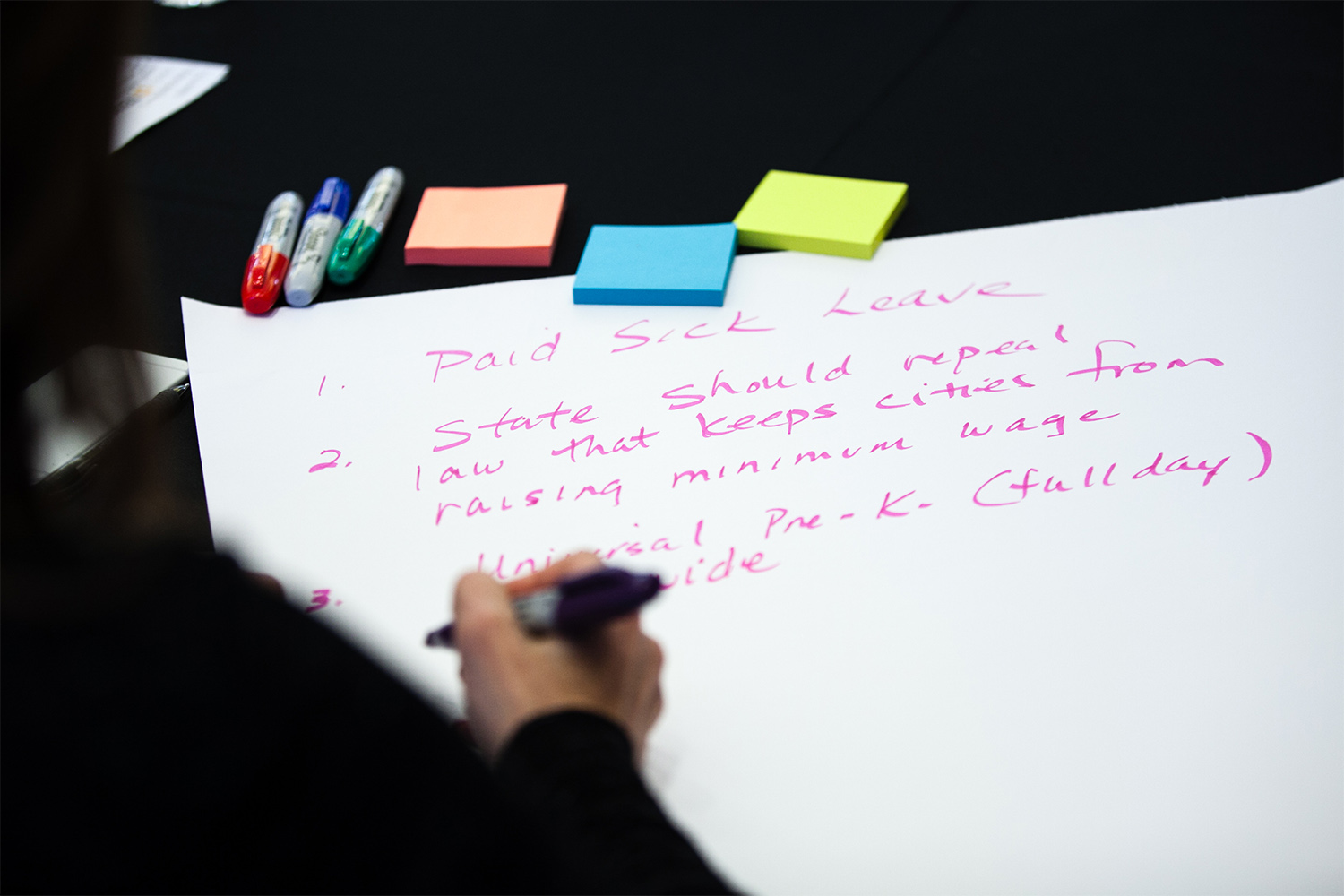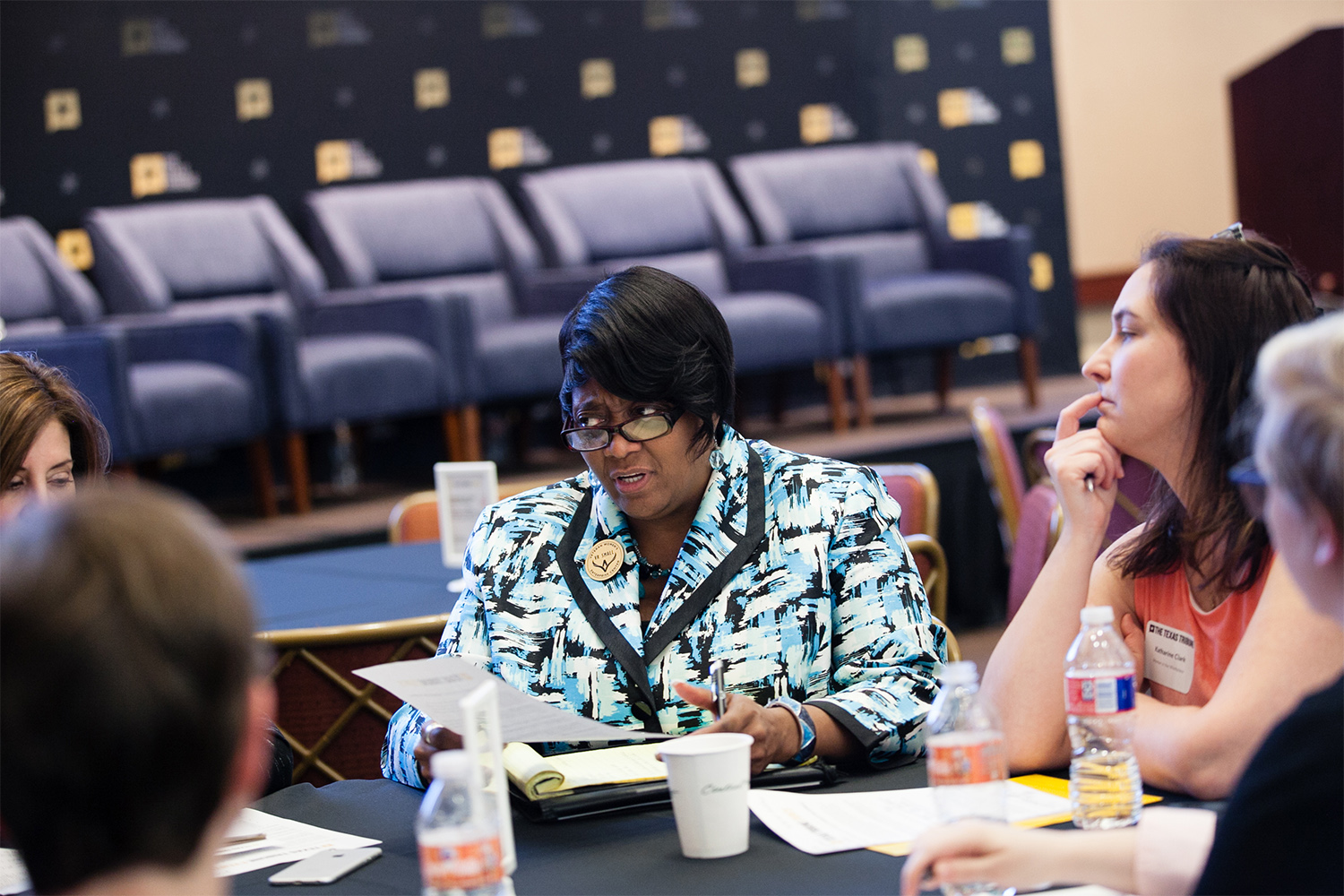Four highlights from The Texas Tribune's women's symposium roundtables
/https://static.texastribune.org/media/images/2018/02/27/womens_roundtable_LBS_1_TT.jpg)
On Monday, as part of its symposium on women, The Texas Tribune held roundtable discussions with roughly 50 Texans from across the state to gather insights on the challenges Texas women face.
Here are four key takeaways:
Find more female candidates
Many of the attendees said they were thrilled with the prospect of having more female leaders in office. About 50 women are running for Congress in Texas this year. But this year’s flood of women running for office comes after a long drought. No freshman woman has come to Congress from Texas since Fort Worth Republican Kay Granger’s election to the U.S. House in 1996, with the exception of former U.S. Rep. Shelley Sekula-Gibbs, a Republican who served as a placeholder for less than two months in late 2006.
“We should really be looking for women leaders in all aspects of civic engagement, and encouraging the women that we know are volunteers or the ones that always show up at the rally,” said Ann Beeson, the executive director for the Center for Public Policy Priorities.
The event attendees agreed: The women taking on leadership roles at the local level — and those actively engaging with their communities — might be the next ones to run for political office.
"It trickles from the top"
Symposium attendees said current issues related to office culture are not exclusive to women. Amy Aughinbaugh, who works at the Communities Foundation of Texas, put it simply: People of any gender want to have a good career and a close connection to family.
One idea the women at Monday’s event rallied behind? Changing workplace terminology from “maternity leave” to “parental leave.”
“This is incredibly important and normalizes access to something that everybody should want and have,” Aughinbaugh said.
But several attendees said workplace culture is influenced by the boss, so more women need to be in leadership positions. Women at the event said they were advocating for new laws — or strengthening existing ones — when it comes to fostering a safe and welcoming work environment. Several said they were in favor of a rule recently passed by the Austin City Council that requires businesses in the city to provide paid sick leave for employees. Others advocated for initiatives such as paid day care and stronger anti-discrimination policies in the workplace.
“It trickles from the top,” said Pat Driscoll, a finance professor at Texas Woman’s University. “If we really want to change the workplace then women have to be the boss.”

“Healthy women are productive women.”
Katie Clark, a Dallas-based attorney, said women who are looking to move up the rungs at work are often put under tremendous pressure. It’s important, she said, for women to keep track of their physical and mental health and to seek help if needed.
“We get so busy doing the things we set out to do that we’re not taking care of ourselves, me included,” Clark said. “I really hope we’re not running ourselves in the ground just trying to get to that next place. If we’re not healthy, we’re not going to move the needle.”
There’s also an economic impact and benefit to having healthy citizens, attendees said.
“Healthy women are productive women,” said Teia Collier, co-owner of the blog Dallas Single Mom. “You cannot do your job, you cannot take care of your family and you cannot be involved in your community if you’re not healthy. That’s what it boils down to.”
Women need to stick together.
Women need to support other women everywhere — in the workplace, at the doctor's office and at the polls, attendees said.
“We’ve got to create a network and we’ve got to lift each other up,” said Malinda Gaul, president of the Texas Employment Lawyers Association. “That means that in the workplace we have to be supportive and then we have to all go together to city hall to get things passed.”
Gaul added, "We just have to all keep supporting each other until we change the things that are going on in this state.”

On Feb. 26, nearly 50 people gathered at the Mabel Peters Caruth Center in Dallas for The Texas Tribune’s roundtables discussions, What’s Next for Texas Women? To be notified of future roundtable events, sign up for Texas Tribune events emails here.
Disclosure: The Center for Public Policy Priorities, the Communities Foundation of Texas and Texas Woman's University have been financial supporters of The Texas Tribune, a nonprofit, nonpartisan news organization that is funded in part by donations from members, foundations and corporate sponsors. Financial supporters play no role in the Tribune's journalism. Find a complete list of them here.
Information about the authors
Learn about The Texas Tribune’s policies, including our partnership with The Trust Project to increase transparency in news.
/https://static.texastribune.org/media/profiles/Alex-Samuels_TT.jpg)